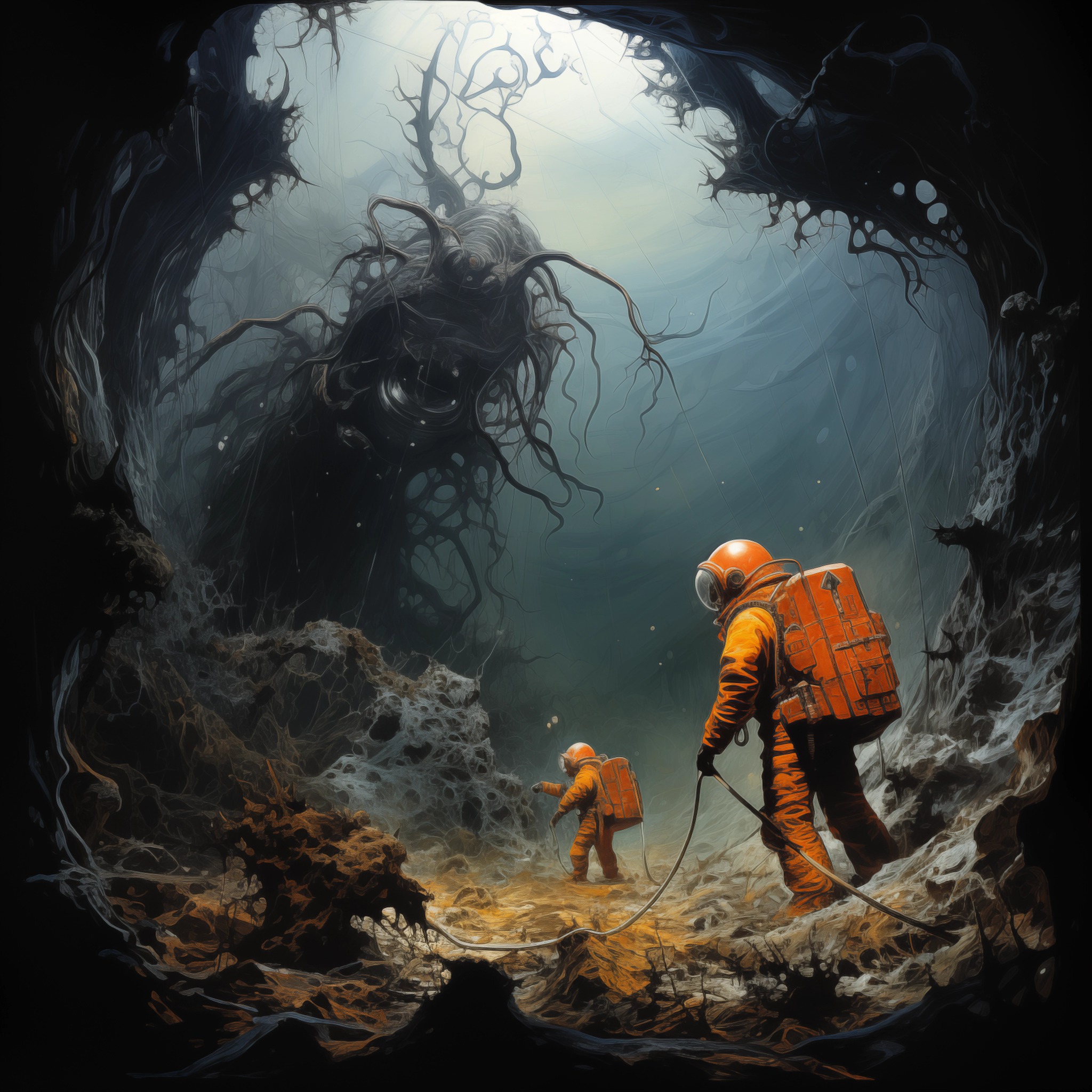They told us that in the darkest depths of the black ocean gold glitters like a mermaid’s horde. The definition of a mermaid has changed since we first set ourselves down in the unfathomable deep, but the materials down here are much more valuable than gold: the sort that forge and annihilate empires in equal measure.
And so our ancestors built the shuddering Deep Riders: vicious steel locomotives that tear through our beautiful abyss, each a steel monster glittering in a mound of neon-lit stations, and between them each that inscrutable darkness, and beneath that hulking engines lurking. The Riders move indeterminably, tearing their haul across the black. None of us know how deep the Abyss goes, so we keep driving downward ever downward, still no end in sight.
I was sent to the engines when I was small and I would scrape through those damp tunnels, grasping at the strange and sometimes terrible things that washed up, dredged inside the supportive beams that keep us suspended inside that black and shining infinity.
I’d find myself wading through reeling mists that felt a thousand miles long, sometimes following trails of the Abyss dust, which burns with a frenzied blue flame like a horde of lunatic fireflies.
I would reach out, encased in my diving suit, towards all manner of pincered and dreadful. Here, a sparkling crab, its carapace glittering with jewels, then over here, a steel trap, bladed and dreadful, left from the Overlanders, those who could afford to stay in the Great Above. They toy with us, so it goes, their trash and the giant steel hulks of their engines drifting, sinking, deep below us.
Once, wading in the detritus lodged between stations, I felt a long, silver tentacle, bristling with teeth drifting across my neck, where all the others I’d glimpsed had suckers. I stayed very, very still. The vast octopi and squid and other multi-tentacled horrors that lurk beneath us like serene ghosts barely perceive us. Our steel edifices are no more permeable within the Abyss than the bygone stone monuments that crumble and jut on its outer strata.
I hold my breath, so that not even the churning of my tattered breathing apparatus makes lines against the water. The immense tentacle streaks past, each tooth flailing like a glowing anemone that is wet and slick and glowing. I catch its blurred outline, straining to see out the sides of my diving mask, animal instinct holding me still.
I can hear singing, a chorus of indescribable melody thrumming in whatever exists deep beneath the rocks we carved the stations into. The words are ancient — in a tongue not for us. The whole song makes me shudder. The creatures here that shriek and sing on their vast scale can blow up steel and human flesh with their sound alone. An echolocation millions of years in the making that makes our soft flesh collapse.
The song reminds me of a distant dream pulsating through the waters, the childhood I never had. My parents died in the black engulfed in blue flame. There was never any time for a lullaby to worm itself inside my brain, and yet here I am: floating, and so very sleepy.
But I must not sleep, not here, and the beeping of my oxygen tank, a casualty of the tentacle, whips me back to reality. I have ten minutes now at most and I grasp the tank to me like a teddy bear, using one gloved hand to suppress the leaking as best I can.
There is a sharp wailing as the tentacle whips back into the fog. I feel the water rushing around me as it propels itself, and the singing moves now, somewhere further into the deep, wherever the beast has disappeared.
In its wake, I look beneath me to see hundreds of sailors, their dead faces contorted into various masks of agony, pale and broken and preserved somehow. They are all sinking, so slowly downwards. A gleaming phosphoresce encases those poor souls with no time for suits. The glowing lends the corpses a warm almost holy aspect.
I close my eyes, just for a few seconds, so I don’t have to look at their blurred faces anymore. Beneath the long-gone sailors, I see the hulk of a broken ship now overgrown with glowing coral, and inside that hulk, by the glass, I see a face that is very much alive. A face matted white with eyes hollowed out in black, and a long drawn smile that curls upwards at the edges.
A jester sitting in the deep. It taps on the glass, gives its golden marotte a shake, hat flaps flailing like iridescent tentacles and I swear I can hear the bells tinkling even out here. And it opens its maw, revealing so many shards of teeth, as if to beckon me in.

